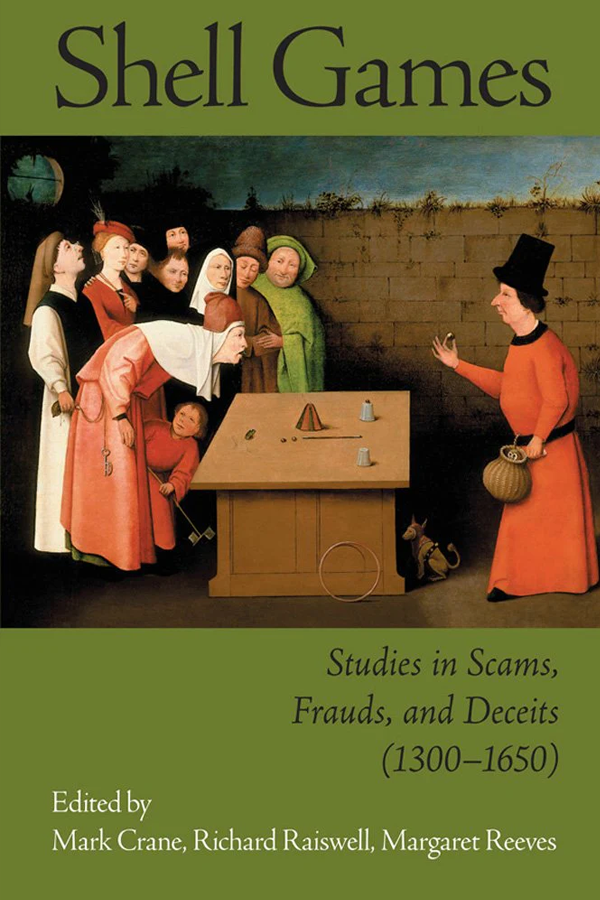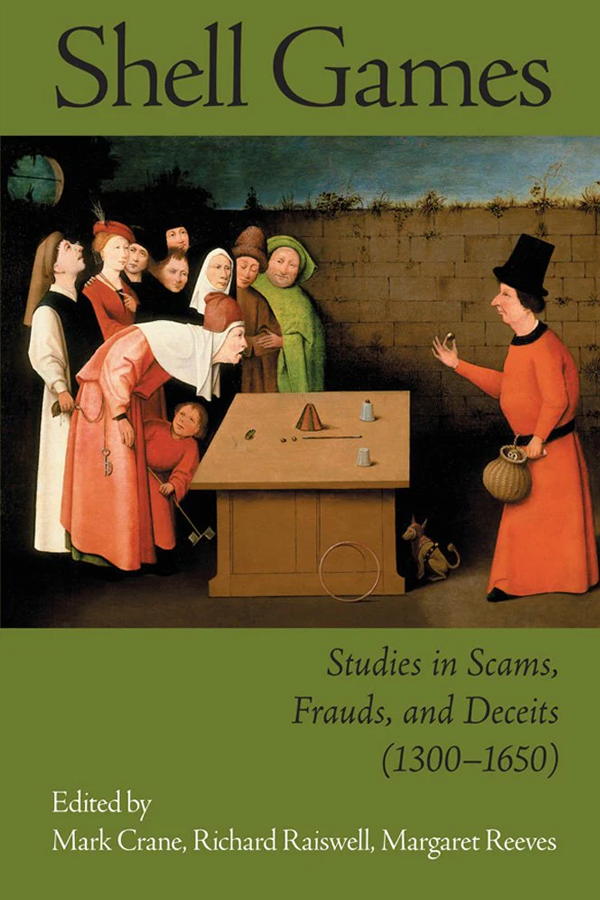Shell Games: Studies in Scams, Frauds, and Deceits (1300-1650)
Edited by Mark Crane, Richard Raiswell, and Margaret Reeves - ES04
Overview
As Michel de Montaigne pointed out, truth’s opposite has a hundred thousand shapes and a limitless field. The papers in this volume are thirteen examples of these hundred thousand shapes and serve as case studies in a potentially limitless field. Treating instances from Italy, Spain, England, France, and the Empire, they are concerned with parochial and patriarchal networks of power. They deal with people on the margins of society, pushing and trying to manipulate boundaries; they deal with people at the very centre of power, endeavouring to conserve or enhance their position. They deal with the strong using lies to oppress the weak and the weak using lies as counter discourses. But at their heart, all of the papers in this collection raise crucial questions about the nature of truth as well as its construction and detection for pre-modern men and women. The perpetrators of these scams, their victims, and the authorities charged with policing them, all grapple with fundamental problems of the role of authority, power, status, gender, tradition, orality, and technology as they craft their schemes or plot their courses of action. In short, they highlight sites of social, political, and epistemological tension as Europe slowly moves from the medieval to the modern.
Mark Crane is a fellow at the Centre for Reformation and Renaissance Studies at Victoria University where he is engaged in a project that examines the conjuncture of printing, education, and religious reform in Paris in the fifteenth and sixteenth centuries.
Richard Raiswell teaches early modern European history at St. Francis Xavier University. He is currently completing a book about English knowledge of India in the period immediately prior to the founding of the East India Company.
Margaret Reeves teaches humanities and literature in the School of Arts and Letters at York University and is currently working on a book-length project that examines satiric political discourse in seventeenth-century women’s fiction.
324 pp.
ISBN: 978-0-7727-2023-8 softcover
Published: 2004
Contents
Illustrations
Acknowledgements
Thomas V. Cohen and Elizabeth S. Cohen, Foreword
Richard Raiswell, Introduction
Knowledge for Sale
1. Tara E. Nummedal, “The Problem of Fraud in Early Modern Alchemy”
2. Sarah Knight, “‘He is indeed a kind of Scholler-Mountebank’: Academic Liars in Jacobean Satire”
3. Paul Dover, “Good Information, Bad Information and Misinformation in Fifteenth-Century Italian Diplomacy”
Reputation and Honour
4. Michael Cichon, “”Tis policy and stratagem must do’: Rape, Deception, and Vendetta in The Most Lamentable Tragedy of Titus Andronicus“
5. Steven Bednarski, “Whence Springs the Lie? Motive and Fraud in the Manosquin Criminal Court (1340-1403)”
6. Roni Weinstein, “Mock and Clandestine Marriages, Deceits, and Games in Jewish Italian Communities in the Early Modern Period”
Government of Women
7. Georgia Wilder, “The Weamen of Middlesex: Faux Female Voices in the English Revolution”
8. Núria Silleras-Fernández, “Widowhood and Deception: Ambiguities of Queenship in Late Medieval Crown of Aragon”
An Idle Press
9. Allyson F. Creasman, “Side-Stepping the Censor: The Clandestine Trade in Prohibited Texts in Early Modern Augsburg”
10. Michael Long, “Rogues, Counterfeiters, and Forgers: Surreptitious Printing in the Popular Literature of Renaissance England”
Inventing the Past
11. Johannes C. Wolfart, “Sex, Lies, and Manuscript: On the ‘Castration’ of the Lindau Archives”
12. Dana L. Sample, “The Deceived as Deceiver: False Testimony in the Case of Robert of Artois”
13. David A. Wilson, “The Myth of Mother Shipton: Prophet-Making and Profit-Taking”
Reviews
The Sixteenth Century Journal, 36:4 (Winter 2005), pp. 1148-1149. Reviewed by Roger A. Ladd.
Renaissance Quarterly, 58:2 (Summer 2005), pp. 725-727. Reviewed by Michael Denbo.
Times Literary Supplement, 5306 (December 10, 2004), p. 33. Reviewed by Elliot Kendall.
Couldn't load pickup availability


